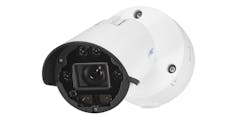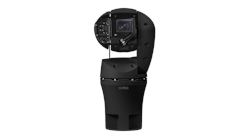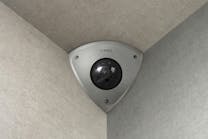30 Under 30: Justin Trueland
When Locksmith Ledger developed the 30 under 30 campaign, my mind began scanning for younger locksmiths working in our industry. Most of the names and faces that came to mind were working for customers of my mine that had been around for a while. Justin Trueland is a 31 year old locksmith business owner who I've always seen as a dynamic young man who was going to do well and make his mark in this industry.
When I arrived to conduct our interview, I first met 22-year-old Jeff, who told me that Justin was the best boss he ever had and that he was learning quickly and enjoying his apprenticeship very much.
Here is my conversation with Justin Trueland of DMD Locksmith.
Locksmith Ledger is doing this interview partly because you're a good guy but also because you're very close to 30 years old and we are focusing on learning more about the locksmiths who are 30 and under. How did you get started in locksmithing?
I worked at commerce bank in the facilities department and Lou, who I bought the business from, was doing business with the bank. One day he mentioned that he would be selling the business and the rest is history.
Were you a locksmith then or what were you doing for the bank?
No I wasn't really. I just wanted to own a business and have a bunch of well trained young men working for me. I wanted to own a business and work with my hands. At the bank I pretty much had a desk job. I started out working in maintenance the first two years and then I was put into a suit and tie and sat in a little cubicle. I was pretty good with people and picked things up quickly. Most of my job consisted of processing work orders and doing contract negotiations. I've been on both sides; I used to deal with the vendors and now I am the vendor.
What about locksmithing made you believe that you'd be successful and enjoy doing it?
I was always interested in locksmithing. I was mechanical and enjoyed working with my hands and I like the fact that the industry was moving in the direction of electronics. It was perfect because I knew I wanted to do it and it was something I could excel at.
Have there been any big surprises for you or anything very different from what you thought then? Didn't you go through some kind of apprenticeship first?
Pretty much everything is different. First I worked with Lou about 18 months before I bought the business. I would spend the day working on the locksmithing and then I'd spend time with Lou at night working on the business part of it. I came to work for him with the understanding that I was buying the business.
You mentioned you liked the direction you saw the industry going in but it was different from what you thought. Can you explain?
What I thought the direction the industry was going in is very different from the condition I found it to be in. Without any real information I perceived it to be an expanding industry in terms of security and securing businesses with biometrics and access control and different things that were on the horizon. I was excited about that.
One thing I have learned is that the competition is ridiculous and it's not just from other locksmiths but from everybody. I think a lot of the competition is coming from areas outside the locksmithing industry and in my opinion the industry is getting kind of picked apart.
So it seems that you picked up the mechanical part of locksmithing pretty well and there isn't much change occurring in that sector, correct?
From what I see, the mechanical aspect of locksmithing peaked somewhere in the 1970s. It's funny because in the almost six years I've been doing this, I'm thinking I came in at a perfect time considering how fast the industry has changed in such a small amount of time. When I first came on, there wasn't the push for electronic stuff residentially in terms of what's available now. When I attended my first conventions with Lou, we'd see locksets and safes and some car stuff, and the one we went to last year looked more like a computer show. You've got transponders, access control, biometrics, etc. It seems like the mechanical part is being taken out of the picture and becoming secondary.
Why do you think this is happening?
Customers are requiring and asking for more security now. They're requiring audit trails, for example. They used to be able to get any key made at a hardware store; now people want to know that their key can't be copied somewhere, if they want to use a key at all. Most people look at keys and locksmiths as second class citizens in my opinion. Many people now, whether it's commercial or residential, rely more on alarm systems and access control, and locks are for the interior office doors. It's much easier to delete a key fob or change an alarm code than rekey their locks.
What did you mean when you said the competition in this industry is ridiculous?
I think the locksmith industry is being picked apart by many industries outside of ours. Especially after 9/11, everybody became more security conscious and things like audit trails were becoming a requirement in many businesses. Companies who were installing fire panels and alarm systems realized that and it wasn't that much of a jump for them to run a wire and hang a card reader versus an alarm panel.
Are you saying that it's a bigger jump for the every day locksmith?
Yes, I think it's more of an alarm or CCTV industry kind of thing than it is a locksmith kind of thing. Going back to the competition topic, you've got the Home Depots and hardware stores selling the ‘you key it' type products. The manufacturers themselves are creating things like the electronic pushbutton locks. On the box itself, they tell the homeowner it only requires a one screwdriver installation. They're making everything, for lack of a better word, idiot proof.
The alarm companies are taking much of the access control and they seem to have a little more legitimacy because they're typically larger with name recognition. On the Internet an end user can buy many security products for a few more dollars than I can pay.
Don't you think it should be a natural progression for someone to ask their locksmith about all types of security work while they're already in there being trusted with the lock end of it?
It depends on the locksmith and the perception they have about that locksmith. He's seen as the guy who comes in and rekeys my Schlage lever or Kwikset knob. He's a great guy but I would never think to call him to run a wire and put a card reader on the wall or for something more technical. There's a definite divide between locksmiths; the middle of the road people are going to have to choose a side. They're either going to have to downsize and become the mobile locksmith or become fully involved in the electronic aspect of it.
What do you mean by “middle of the road?”
I'm talking about the ones who haven't pushed to become educated. If they haven't made the effort to change their customers' perception, then their customers aren't going to take them seriously. They won't go to them for something seen as more complex like a maglock or biometrics, for example.
How are you handling this with your company?
The former owner of the company was very mechanically focused and had interest in tinkering with electronic locking devices but really didn't pursue it. At the time he was selling the company, he wasn't in a position to invest the way you'd need to move in that direction so the company was frozen in about 1985. I didn't realize the position we were in until I actually bought the company. At that point I began with the education process for myself and the techs I hired. We started wearing uniforms so we could be perceived more professionally.
How did you begin the education process?
Mostly through GPLA (Greater Philadelphia Locksmith Association). Really the main thing was to change our image and once we did that, things began to change. Within a month we moved to a nicer location with nice furniture. At the beginning we'd be mistaken for janitors just wearing the basic attire of a mechanic. Now we're mistaken for IT professionals or something along those lines. We're no longer being associated with janitors (nothing against janitors) and people are shocked when we say we're locksmiths. They're used to seeing maybe an older gentleman who isn't well kept or, for lack of a better term while trying not to offend anybody, the stereotypical locksmith.
You're talking about an issue that has been one for quite some time in our industry so this won't be the first time we risk offending someone.
It's not simply physical appearance; it's more about the image you want to project and you have to project a professional image if you're going to be successful. With manufacturers making products that can go straight to end users via big box retailers and the alarm companies that are surrounding the locksmith, the industry faces some serious challenges. They are looking and acting professionally and taking the business that should be the locksmith's. The locksmith is the one who should be automatically associated with security.
What else do you think is important to keep in mind to be successful today as a locksmith?
Education is key. The customer is becoming more knowledgeable mainly due to the Internet and the amount of information they can access. If you don't stay up on it, then people will tend to not take you seriously. If you don't know about the latest products, you won't have the answers the customer is looking for. There are locksmiths out there who are making sure their techs are educated and are trying to steer the business back towards us, the security professionals.
I've gotten myself in trouble by questioning the efforts being made by associations to properly promote the industry as a whole. What are your thoughts?
I think that any association in any industry should do as much as it possibly can to better the industry and to influence the public perception of that industry. There needs to be a definite move in that direction or in five years there may not be a locksmith industry left. I know that sounds ridiculous from someone who's been in it for only five years, but in that time I've seen amazing changes in an industry where it's becoming harder and harder to do business. Every year you can bet on increases from a major manufacturer but it seems like the price is always the same at Home Depot. The only thing we can do is to stay ahead of it and offer a professional service, which is something you can't get most other places.
Where do you see your business going in the next five or 10 years? Do you have a plan?
We always have a plan in place. You have to be ready and willing to change the plan at any moment and be flexible in a fast moving environment. If the industry changes as much in the next five years as it has in the last five years, it will be a completely different industry. There'll be locksmiths around who will be more like an ADT type company. You're still going to have the 1-800 guys but you're seeing more and more the trend towards not having to use keys at all in the future.
When you made a conscious effort to change the public's perception of you, did you see an immediate impact?
It drastically changed! When I tell customers that my company installs access control systems, they then respond by talking to us about upcoming jobs and needs that they had. Previously they would respond with a polite “oh, that's great” and drop it. Everything is a matter of perception. Obviously you have to market yourself. But you could market yourself all you want and if you look like a slob and without enough product knowledge, then they're not going to listen to you. I also think a company has to streamline and create a ‘brand' that the customer will remember.
During the planning stages of your day with your employees, do you talk about sales and how to accomplish additional sales out there?
It's an ongoing training process. I have very good guys that work for me; they're skilled, intelligent and very courteous. This is something that they want to do; they want to work for a company that they're proud of and supports them in their efforts to do work that results in a quality service at a fair price.
What else is unique about how you treat your employees?
I get my guys involved in the company. I let them know what the numbers are and let them in on more than most other owners would. I've found that doing that helps them to help me to make the business better.
At the risk of discussing this in front of them (two employees were present for the interview), are they compensated based on production?
Not on a commission basis with a percentage but we do raises every four or five months instead of annually and the raises aren't tiny percentages. Involving them in the numbers and letting them know that the way they act and the things they do directly affect the bottom line affects not only their job but what I'm able to give them in the form of a raise. The employee is only as good as you make them and I don't even like referring to them as employees. They're as much a part of the reason that I'm successful as anyone else is.
What would you like to see from the industry in terms of support?
I believe that the main thing that will change the industry is the associations and licensing. This is a security industry so I think we should have background checks and have real companies that are working within the rules of the state they're in and not a call center somewhere in Nebraska where you get a guy who shows up in a concrete truck and drills out a Kwikset for $400 in the middle of the night. I know there are people out there who are disgruntled but until everyone is licensed, there won't be a level playing field for all. I believe if you're licensed, that goes along with having uniforms and not being the guy who pulls up in beat up pick up truck who just got finished hanging drywall and he's a locksmith because he knows how to put a Kwikset knob on. You're a professional. Plumbers are licensed, electricians are licensed and it goes a long way in uniting, between associations and licensing, the true locksmiths who actually care about the community they're in. I think it will start to eliminate the riffraff and the guys who are giving the industry a bad name.
Steve Kaufman
Steve Kaufman has worked for distributors in the locksmith industry since 1993 and worked as a full-time locksmith from 1978 through the 1980s. Kaufman is the sales manager for IDN Hardware out of its Philadelphia location.





